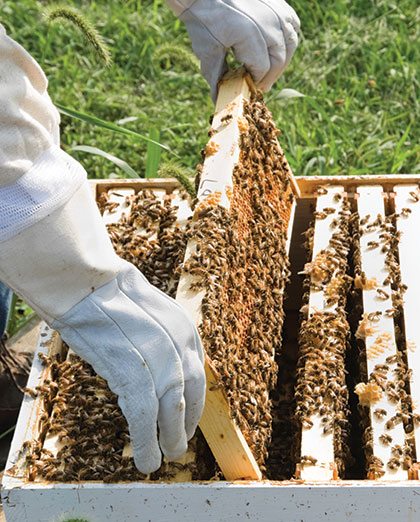
Navigating change in a rapidly evolving industry. Many of the experts in this year’s Giant Views of the Industry had interesting stories to tell about facing change and creating opportunity from it. Enjoy some of the highlights of their news and insights.
Social Media Master
“It was six to eight months ago that I noticed agriculture was using Twitter quite a lot and I’m amazed by how much information is shared there. It’s a great to see producers talking amongst themselves about setting up a piece of equipment, looking for a part and so on. You also see breeders talking to farmers directly, and breeders talking to grain handlers. I see it as a big opportunity for Alliance going forward. As an organization, we are committed to getting quality genetics into the right geographies with the right information. Twitter is a fantastic tool where we can share information — our growers can share information with our customers. At the end of the day, I’m not looking to sell seed or grow this business by having customers grow the wrong variety in the wrong geography; it’s about trying to get the right genetics and the right geography.”
— Chris Churko of Alliance Seed
Farm Saved Seed: Setting the Record Straight
“Ministers have made the comment, and we’ve emphasized it through all our consultations — UPOV 1991 is actually going to strengthen farm saved seed. It entrenches in law a farmer’s ability to save, clean, treat, store and reuse that farm saved seed as long as they’ve made an initial, qualifying purchase of seed, and do so for as long as they wish on their farm. One of the misconceptions really early on was that this is somehow going to impact farm saved seed, and we wanted to be very clear in the legislation — that’s not the case. Farmers will have the ability to do that.” — Anthony Parker of the Plant Breeders’ Rights Office, Canadian Food Inspection Agency
The Importance of Science
“Pollinators and neonicotinoid seed treatment is the biggest issue we have faced in my 37 year career in the seed industry. Moving away from a science-based regulatory process at any level of government is very dangerous as emotions and public opinion end up playing a bigger role in the future of our industry. This industry was founded on innovation and investment in long-term multimillion dollar product development cycles. The planning and launch of seed and related technologies are several years in the making. The uncertainty resulting from this questionable method of decision-making — some of which are politically driven — has the risk of having investment go to more favourable jurisdictions. The demands of a growing population and the need for a more healthy planet will continue to drive these positive innovations. Our science-based regulatory process is not broken, but in this issue it is being ignored. We are working hard to find a manageable path forward to find some common ground with the provincial government that will hopefully stop the need for a legislative mandated reduction in neonic corn and soybean acres in a very short time frame. We have an engaged membership, and we are working closely with industry stakeholders to find real solutions to this issue. I am confident if common sense prevails, we will find a solution that will not set modern agriculture and environmental safety back 25 years.” — Dave Baute of Maizex Seeds and the Canadian Seed Trade Association
When looking to protect pollinators, the seed industry calls on government to make decisions based on science — not politics.
Protecting IP
“Intellectual property needs to be protected for a number of reasons, all of which have to do with the ability to advance capabilities through ongoing research and development, costs that are often carried by the revenues generated from a previous generation’s investments in IP. It can be a self-sustaining feedback loop, with the direct benefit of increasing the amount of food that we can grow. Another reason for the protection of IP, and perhaps more importantly is that in agriculture, similar to that of computer software, a failure to protect can lead to an exponential growth of uncontrolled product. As it is, or was, easy to massively duplicate computer software, it is equally easy to reproduce, and therefore duplicate, certain varieties of seed. And as we all know, one bag of seed can be planted, harvested and cleaned, turning that one bag into many, many bags of seed. When this goes unattended, the problem grows exponentially, both horizontally and vertically, in that the initial violator is motivated to increase the size of his production, vertical growth, and others will also be motivated to start a similar process, horizontal growth. As one can imagine, this problem can easily spin out of control. This leads to rapidly decreasing revenues, shrinking R&D budgets and subsequently slowed, if not stopped, innovation; which, over the next 30 years literally means less people being fed.” — Dennis Birtles of Evident: Corporate Investigations and Agro Protection International
Syngenta’s Good Growth Plan
“Syngenta China is fully part of the company’s Good Growth Plan. We as a company realize that when you ask people ‘how are we going to feed the world in 2050 with two billion more people on this planet,’ everybody agrees we need more farmland, we need more water, we need more labour, we need more of everything. … The way Syngenta is getting involved is that we are committed to six areas and by 2020 what we want to do is increase crop productivity, we’re talking 20 per cent worldwide; we want to enhance biodiversity; we want to get back millions of hectares of land, which are becoming not usable for agriculture; we want to empower smallholders; we want to keep people on farms safe; and, last but not least, we want to take care of all the people within our supply chain. In China, we will focus on three of these commitments. As an individual, as a citizen, I feel really proud to be a part of this initiative and I think it is a way to sort out the future difficulties we will face by 2050 if nothing is done.” — Pierre Cohadon of Syngenta
Vitamin Enriched Traits
“I don’t know how vitamin-enriched traits are going to play out in the future. When I look at biotech adoption in the world, they [vitamin-enriched traits] might be one of the ways to have the least amount of resistance — in China, golden rice has gone through this. There are vitamin deficiencies in many areas of the developing world. If we can find ways to fix that, ways to make it better, ways to make the diets, which are very limited, healthier — the value that has is amazing. I find it very hard when we have accepted science in every other area of our life. We’ve got people that need food and need vitamin-enriched food. I cannot understand how people can go against science that can help people be healthier, feed hungry people and still say no. Healthier diets can make a significant difference.”
— Bryan Gerard of Gerard Seed Solutions
Julie McNabb














